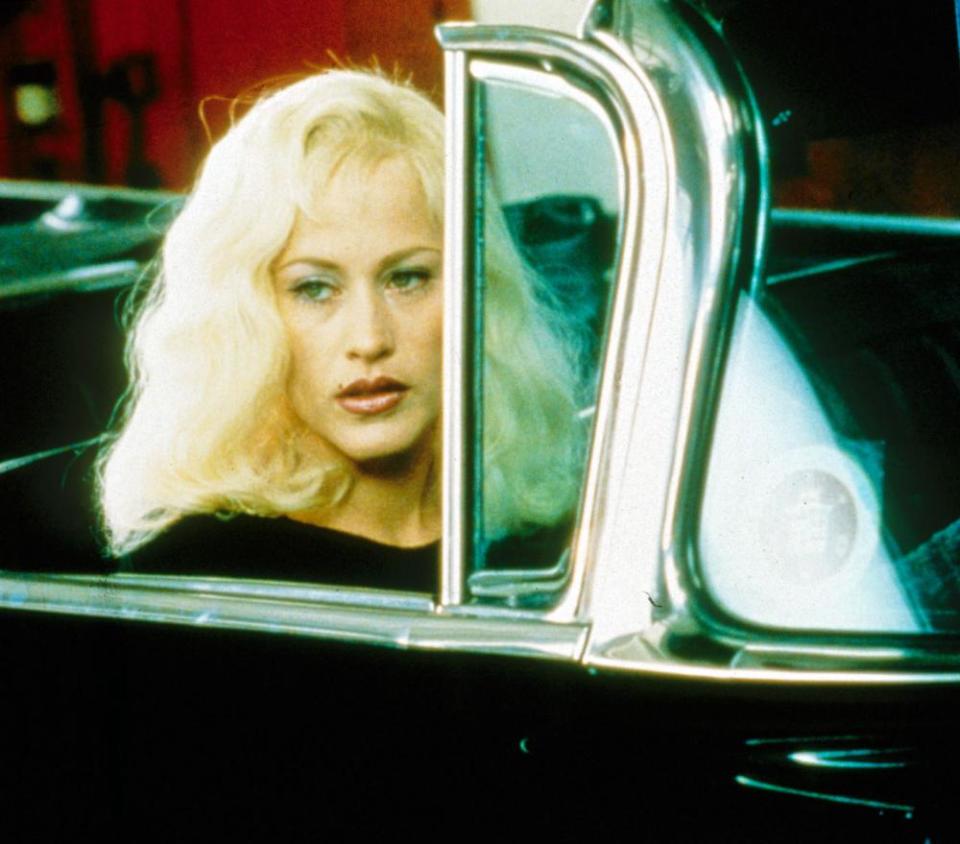‘I visited a dominatrix club where customers were used as tables’ – Patricia Arquette on making Lost Highway
Bill Pullman, actor
I had to drop out of Boxing Helena, Jennifer Lynch’s debut film. But I had a good connection with her; when her father, David, starting talking about making Lost Highway, she said: what about this Pullman guy? Early on, someone asked him why he cast me. With a smile on his face, he said: “Well, Bill struck me as the kind of guy who could get himself into a lot of trouble.” He would repeat that, like a mantra.
I’ve done a bunch of noir stories. I like the fact that the genre can be both scary and funny. But David’s version of noir was so intense and surprising. Like reflecting how mundane people can be when they’re talking about death, or how surreally beautiful it is when one character’s head is sliced in half by a table. That’s a tone that is very hard to get, and you can’t fake it. You have to have clear conviction about what story you’re telling.
I want you to go down the hallway, said David, and everything is familiar. And then it’s not. It’s all kabuki!
He didn’t elucidate much for us. But during pre-production, he came in with the Diagnostic and Statistical Manual of Mental Disorders and read us the passage about a psychogenic fugue, a form of dissociative amnesia. I had the chutzpah to suggest I should play both Fred Madison, the saxophonist paranoid about his wife in the first half of the film, and also Pete, the young mechanic whom Fred transforms into the second half, played by Balthazar Getty. But he said: [David Lynch voice] “Nope! I really like it this way, with different actors.”
The Madison house where we filmed was next door to David’s own – he bought and designed it that way for the film. It still exists in the same state; he uses it as a production office. It was a challenge to be as neutral as Patricia and I are in our performances. There was something bordering on bland we were striving for. Almost like an absence, like you’d see with a psychopath.
David and the cinematographer, Peter Deming, worked on getting that spookifying atmosphere in that hallway. They experimented with a mechanism that could hinge the lens completely off the camera to capture darkness better. David doesn’t yell, but is good at getting everyone to instinctively zone in on what he wants. We’d had a conversation earlier about moments in life that are a little heightened. I said: “Like kabuki.” Later that night he said: “I want you to go down the hallway. And everything is familiar. And then it’s not. It’s all kabuki!”
Doing press for Lost Highway in Europe, everyone was, like: “Wow, this is great.” But everyone in the States was, like: “Can you explain it to me?” It’s easier to embrace now. The world has gotten more like the film: fractured. Maybe this reality Fred participated in is what we’re living in now.
Patricia Arquette, actor
David didn’t tell me whether Renee and Alice were two different people, or versions of the same woman. He asked me what I thought. I decided that they were women through the eyes of a misogynist. So when Fred recreates himself in the second half as Pete, this young, virile guy, Alice still isn’t trustworthy. She seems to love him but she works in porn. It’s very rare to look at this idea of how dangerous female sexuality is in the eyes of a guy like Fred/Pete – especially in this poetic way. David wrote the script at the time of the OJ Simpson trial, which he was obsessed with.
With costume artist Patricia Norris and makeup artist Debbie Zoller, we worked together to create two contrasting looks. For Renee, I wanted that dark hair and those kind of bangs, like Bettie Page. We may have talked about her resemblance to Elizabeth Short, the “Black Dahlia”, too.

I visited some weird clubs to prepare for the part, including this dominatrix place where some customers paid to be used as tables. I tried to study what the power dynamics were in there, the microexpressions in people’s faces. The majority start out as submissives before they become dominatrixes. I think Renee/Alice experienced those echelons of humiliation.
I also tried to look at female sexuality in an abstract way. These vixen women, like Salomé or Jezebel from the Bible, who have the capacity to destroy. So, for example, when Alice is forced to strip for those gangsters, I was thinking of Salomé dancing for Herod. There was some weirdness with some of the actors in that scene. I told David they were saying creepy, lascivious things, and he asked me to go outside. When I came back, they were all looking at the ground very apologetically.
One of the reasons I took the role was my phobia of nudity, but doing all those nude scenes didn’t cure it. I had to peek through my fingers when I watched those moments in the film.
David doesn’t feel like a dark person to me. His movies are much darker than anything I observed. I remember years ago I was in Bali. The people there are so lovely and nice, but they have these cockfights, which are so dark and intense. They give you ribbons, interwoven in white and black. It’s about the balance of light and dark. I think David has been on a quest looking at that balance.
• Lost Highway is out on Criterion Collection Blu-ray on 31 October.


